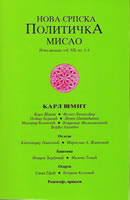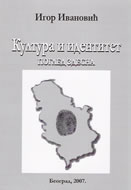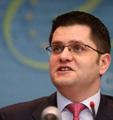| NSPM in English | |||
Address Before the Second Serbian Ambassadors’ Conference |
 |
 |
 |
| уторак, 20. јануар 2009. | |
|
Belgrade, 11 January 2009 Dear Foreign Minister Moratinos, Respected Dean of the Diplomatic Corps, Excellencies, Ladies and Gentlemen,
To our distinguished guest from Spain—a very warm welcome. Miguel, my friend, I’m so glad you’re here. I want to make use of this opportunity to say how profoundly grateful we are for your country’s unwavering support on all fronts. What Spain has accomplished in the last several decades is truly amazing. Encouraged by your example and aided by your experience, Serbia too can leap into her European future. I would also like to extend a heartfelt welcome to the diplomatic corps. Your devotion to the advancement of our bilateral relations is laudable indeed. I look forward to engaging with you further in 2009. The more we work together, the more we get to understand each other. A special acknowledgment of gratitude to the representatives of the great many UN member States that honor Serbia’s territorial integrity. Our nations stand together in safeguarding the foundations of international law, as set forth in the UN Charter. Lastly, to the ambassadors of the Republic of Serbia abroad, and to our Belgrade-based diplomats—I extend a message of sincere appreciation. You are inheritors of a long and proud tradition of Serbian diplomacy. I thank you for your continuing sacrifice and dedication. Excellencies, Ladies and Gentlemen, Today we gather in sober awareness of the importance of finding a common approach to the challenges of a world in the midst of geo-strategic turbulence. A great deal of the globe is in flux; the economic crisis is worsening; fault lines are multiplying; and the balance of power is shifting. Unpredictability and uncertainty imperils us all, as an unprecedented rapidity of change comes to characterize our transformational times. The circumstances are new; the tasks of responsible statecraft, many; the interdependence trend, irreversible. The question, therefore, is how best to go forward together: how to navigate beyond the undercurrents, and away from the myriad rocks and shoals in our way? The answer must take into account an additional fact: in today’s world, statesmen do their work in public. In the foreign policy arena, this poses a particular challenge. We conduct diplomacy in an environment where events can be experienced as they occur—by politicians as well as their publics. The flow of information happens in an instant. Cameras roll as leaders work to maintain a consistency of vision, while sustaining popular support for important decisions—a difficult task even in the best of times. Especially in periods of geopolitical change, diplomacy becomes more difficult to practice effectively. In straining times when pressure builds, some begin to believe that the only safe course of action is to tactically retreat—so as to be better able to respond to events that one cannot influence anyway. This may have been a valid option in the past, but not today. In the 21st century, isolation is not a sign of prudence, but of gross misjudgment. It creates space for others to impose themselves on a helpless actor, to limit strategic options and constrain their execution in ways that harm national interests. It relegates the country in question to being a mere object of the international system, instead of a valued participant in its transformation. In short, the present circumstances dictate that only a well-planned and carefully executed, active foreign policy can contribute to the advancement of any country in the global arena. Ladies and Gentlemen, Under the leadership of President Boris Tadic, the Republic of Serbia has done just that. And we did so under incredibly trying circumstances, for 2008 has been the most difficult year of our political transition to date. Two national elections were held in our country last year, one presidential, the other parliamentary. It is no exaggeration to say that these were referenda about how to interact with the world of today: our citizens were given a clear choice between two opposite ways forward. They decided to keep their appointment with Europe. All this took place in the somber context of the unilateral declaration of independence by the ethnic Albanian authorities of our southern province of Kosovo and Metohija. At the time, we made it clear that the Republic of Serbia would never recognize UDI. This position is enshrined in our constitution, and will not change. Ladies and Gentlemen, The resilience of our democracy was severely tested. Serbia faced the challenge head-on, choosing to respond to Pristina’s ethnically-motivated attempt at secession peacefully, within the rules of the international system. Serbia’s strategic decision to contest the Kosovo issue at the International Court of Justice—by prevailing in the United Nations General Assembly—constituted a paradigm shift in favor of peace in the Western Balkans. At Serbia’s initiative, an issue of such fundamental importance and complexity—passionately involving all at once identity, boundaries, communal rights, opposing historical narratives—was steered clear of resorting to the force of arms for the first time in the history of our region. Also at Serbia’s initiative, a crisis of legitimacy to international action in our southern province was overcome. A binding agreement welcomed by the Security Council was reached on UNMIK’s reconfiguration and the status-neutrality of EULEX. Through the embrace of international law, persistent engagement and proactive diplomacy, in 2008 Serbia managed to compartmentalize the fallout from UDI without compromising our democracy, impeding our EU accession process, and damaging our network of bilateral relations. Ladies and Gentlemen, The Republic of Serbia has set three core foreign policy priorities for this year: carrying on diplomatic efforts to defend our constitutional order, accelerating the process of our European integration, and improving regional cooperation in the Western Balkans. In the wake of UDI, continuing to peacefully defend our sovereignty and territorial integrity is a vital national interest. Serbia’s red lines are clear, and they will continue to be honored by our Government without exception. We hold the view that all UN member States should respect the fact that the International Court of Justice will adjudicate on the legality of Kosovo’s UDI throughout 2009. No one should in any way pre-judge its deliberations. We therefore expect no one to encourage further recognitions, just as we expect membership in regional or multilateral institutions that are the privilege of sovereign states not to be extended to the authorities in Pristina. Such initiatives could only upset the unstable equilibrium on the ground, which is surely not in anyone’s interest. Last but not least, Serbian diplomacy will be tasked to work vigorously in ensuring that the international community remains keenly apprised of developments in our southern province. Ladies and Gentlemen, The central strategic priority of the Republic of Serbia is to accelerate the process of our European integration. We will devote all available resources to the fulfillment of this crucial goal through active and sustained engagement with Brussels and EU national capitals. The successive Czech and Swedish Presidencies present two beneficial opportunities to greatly advance Serbia’s European future this year. To further this aim, I believe that the following three, mutually-reinforcing components constitute the basis of a very realistic, concrete and deliverable package for 2009. First, that we work together to ensure visa liberalization becomes a reality for the citizens of this country. Support for EU integration is at an all-time high in Serbia. To sustain it, the burdensome restrictions on travel to Europe must be lifted—for freedom of movement, the right to travel visa-free, is an embodiment of what the EU is to our citizens. The road to Europe should not begin in a line that stretches far down the sidewalk in front of an embassy. Citizens of this country should not be required to take a few days off work to apply for a visa to visit their relatives. They should not have to demonstrate that they own their own apartment to go to the Louvre. And they should not have to prove their creditworthiness to visit the Acropolis, see the splendors of Rome, or walk along the cobble-stones of Salzburg. ____ The second component centers on synergizing our efforts to overcome the recalcitrance of few on the definition of full cooperation with the ICTY. No one should doubt that Serbia is acting in complete sincerity. We are doing everything in our power to fulfill our obligations to the Tribunal—and we will continue doing so. It is past the high time to un-freeze the Interim Agreement between Serbia and the EU, so that we may focus all our efforts on fulfilling the Copenhagen Criteria as fast as we can. The third component revolves around Serbia’s upcoming application for membership in the European Union. We hope that the Council of Ministers will welcome its arrival, and swiftly forward it to the European Commission—tasking it to promptly provide the Council with an avis on its merits. This would allow Serbia to achieve Official Candidate Status by the end of the year. Making this package happen is the best way to advance Serbia’s European future. I think it can be done. And I think there is no better way forward, if the region’s comprehensive interest is what we seek to promote. Ladies and Gentlemen, The third core foreign policy priority of the Republic of Serbia is the enhancement of regional cooperation in the Western Balkans. I remain firmly convinced that the regional process of enlargement can only be completed by working in concert, and not at cross-purposes. Mutual support and genuine encouragement are not merely policy options, but strategic necessities. Unfortunately, the unity we seek has been somewhat undermined recently, for some of our neighbors made regrettable choices last year. The Kosovo issue has created new regional fissures. And notwithstanding the fact that these unfortunate decisions struck at the heart of Serbia’s constitutional order, Belgrade has continued to act responsibly. Our carefully measured response to UDI recognitions by some of the countries in the Western Balkans ensured that the political fallout which naturally resulted was largely contained. As a result, regional relations did not suffer, especially in the economic field. Take a look at the statistics: in the wake of UDI recognitions, the flow of good and services did not decrease, tariffs and penalties were not imposed, and cross-border investment did not decline. ____ Before moving on to the next portion of my remarks, I want to say a few words about the lawsuit for genocide that Croatia submitted to the ICJ against my country. We had tried to find an alternative road leading to reconciliation—to no avail. Notwithstanding the moral and historical reasons for doing so, the Republic of Serbia had no legal choice but to commit to a counter-suit against Croatia. Such is the unfortunate current state of affairs. It has not been of our making. But we are where we are. It now becomes our joint responsibility—to ourselves and the victims, as well as the region and the European Union—to work through the present complications. The historical record will now be taken up by our respective legal teams. Contesting the past in the halls of international justice could very well end up enabling the Governments of Serbia and Croatia to concentrate on what brings us together in 2009, not what sets us apart. In the Europe of the 21st century, there is no strategic alternative to genuine regional cooperation. Ladies and Gentlemen, The relationship that our country has traditionally enjoyed with Russia will remain close and comprehensive. The strategic energy partnership between Moscow and Belgrade that was signed by our two presidents last month is but the latest chapter in our long history of working together on topics of mutual interest. Moscow has been one of Serbia’s most stalwart and active allies in the peaceful defense of our sovereignty and territorial integrity. I would like to take this opportunity to once again thank Russia for its solidarity, assistance and support on the Kosovo issue. I am in no doubt that our ties will continue to be strengthened in the years ahead, especially in the context of Serbia’s European accession, which would create the framework for a new, more profound dimension to our most special relationship. Not only would our EU membership ensure that Russia’s access to the common European market would be deepened, but it would also lead to an increase in both understanding and cooperation between Moscow and the Brussels. ____ Turning now to the United States, I should emphasize that our ties with America go back more than 125 years. For most of that time, our two countries stood together in defense of common values and the cause of freedom in the world. Unfortunately, our relationship suffered notable setbacks throughout the 1990s, and more recently, in the context of Pristina’s UDI. Despite our differences, I believe that January 20th provides us with a strategic opportunity to start the difficult task of improving our relations, in the interest of consolidating peace and stability in the Western Balkans. Moving constructively forward in the context of a divergence of views is an approach we have not yet tried. To use the words of President Abraham Lincoln, “the occasion is piled high with difficulty, and we must rise with the occasion. As our case is new, we must think anew, and act anew.” ____ We will also continue to devote particular attention to deepening our close ties of comprehensive friendship with the People’s Republic of China and the Republic of India, both traditional partners and global players. We look forward to continuing to work with these two great nations as they strengthen their leadership and assume even greater responsibility in the international arena. Ladies and Gentlemen, As a co-founder and host of the First Non-Aligned Summit held in Belgrade in 1961, my country devoted decades of effort to help ensure that the Non-Aligned nations received due international respect, dignity and influence. Serbia is dedicated to keep building on this important legacy, and will enhance its contribution to promoting the deep sense of solidarity that exists between our countries. Old friendships must never be forgotten. In 2009 and beyond, they will be fortified and strongly promoted. We plan to significantly increase our engagement with the Non-Aligned Movement. Ladies and Gentlemen, Serbia is the indispensable anchor of democratic stability and security in the Western Balkans. Our purpose is clear, our capacity is evident, and our will to become fully integrated into the European Union is unshakable. By combining our efforts, Belgrade and Brussels can secure the European future for the entire region. Together, we can complete the construction of Europe—the grandest peace project ever undertaken by mankind. This will require men and women confident in their strength, compassionate in their hearts, and steady in their vision. For there it rests, just beyond our present reach, beckoning to us all: the promise of a fully integrated, prosperous Western Balkans. Ladies and Gentlemen, I come to the end of my remarks with an encapsulation: the Republic of Serbia—a proud democracy that in 2008 weathered enormous challenges against incredible odds—seeks to further engage with the region and our many friends throughout the world, as we continue to defend our constitutional order and pursue our central strategic priority: making 2009 Serbia’s leap year of European integration. As President Tadic has said, “the time for anyone to procrastinate, to try half-measures, to use soothing words and baffling expedients that delay and discourage, is coming to a close. In its place, we are entering a period where only results matter—a period of consequence and momentous choice. So let us always keep in mind what the real prize is: a safe and prosperous future we can all share—a European future for the entire region.” ____ Now comes our time of testing. Moments such as this one come along rarely in history. They are either seized or lost, and the effects can reach across decades. The opportunity is here. We must grasp it and nurture it, so that it grows strong and good. Let us all have the courage to see our common vision through to its expeditious and noble completion. Thank you for your attention. (Minister of Foreign Affairs of the Republic of Serbia) |
Од истог аутора
- Из архиве - Remarks Before the Foreign Affairs Committee of the European Parliament
- From Balkan Wars to Balkan Peace
- Serbia is dedicated to solving all differences at the negotiating table
- Our Kosovo policy will not change
- 2009 was Serbia’s best EU accession year ever
- We will never recognize UDI
- Kosovo is without a doubt the darkest corner of Europe
- Serbia, the United States, and the Riddle of Europe
- Serbia will be a bridge between the European Union and the African Union
- Kosovo is our Jerusalem
- Minister of Foreign Affairs Vuk Jeremic’s Speech at the UN SC
- One Nation, Indivisible
Остали чланци у рубрици
- Playing With Fire in Ukraine
- Kosovo as a res extra commercium and the alchemy of colonization
- The Balkans XX years after NATO aggression: the case of the Republic of Srpska – past, present and future
- Из архиве - Remarks Before the Foreign Affairs Committee of the European Parliament
- Dysfunction in the Balkans - Can the Post-Yugoslav Settlement Survive?
- Serbia’s latest would-be savior is a modernizer, a strongman - or both
- Why the Ukraine Crisis Is the West’s Fault
- The Ghosts of World War I Circle over Ukraine
- Nato's action plan in Ukraine is right out of Dr Strangelove
- Why Yanukovych Said No to Europe

.jpg)








 It is my great pleasure and privilege to greet you all to the second Ambassadors’ Conference of the Serbian Ministry of Foreign Affairs.
It is my great pleasure and privilege to greet you all to the second Ambassadors’ Conference of the Serbian Ministry of Foreign Affairs.













